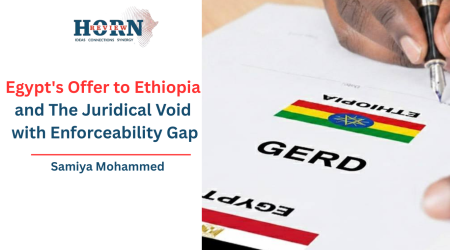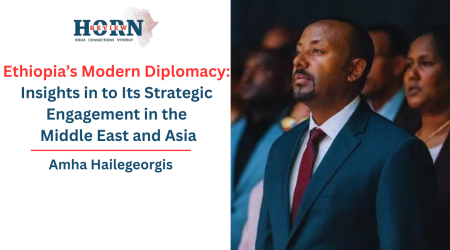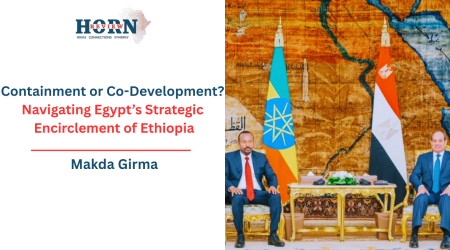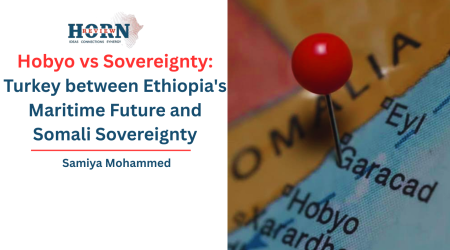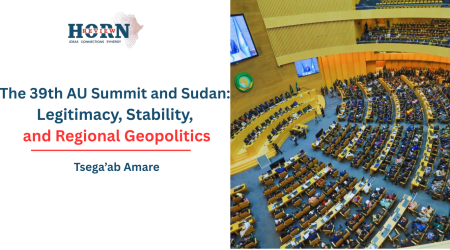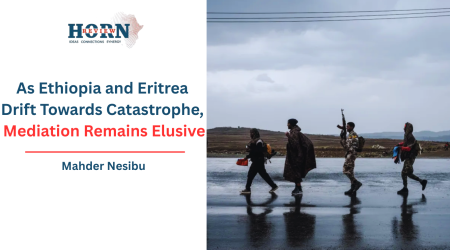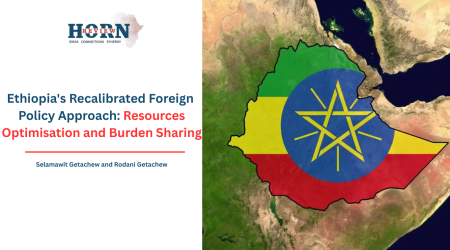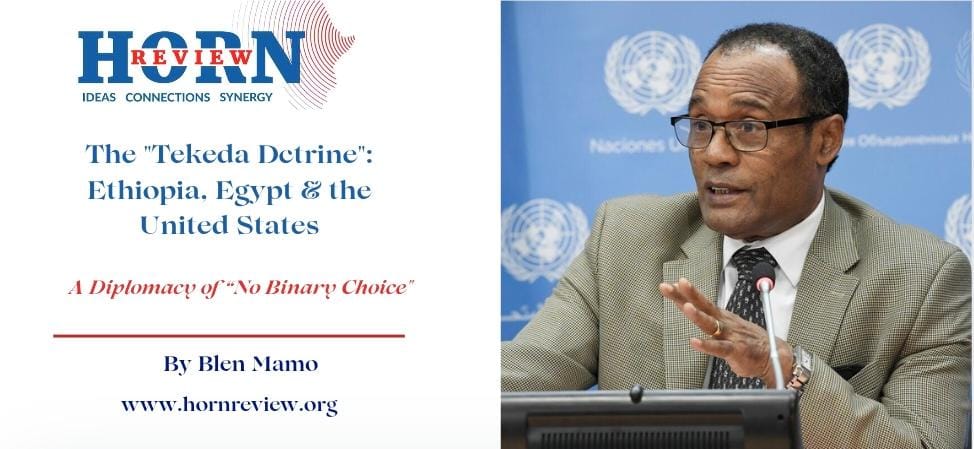
27
Oct
The “Tekeda Doctrine”: Ethiopia, Egypt & the United States
A Diplomacy of “No Binary Choice”
The contest over the Nile has long defined the strategic relationship between Ethiopia and Egypt. While Cairo relies on historical treaties, military capabilities, economic influence, and deep partnerships with the United States to secure its position, Addis Ababa wields geographic, hydrological, and normative leverage that few states can replicate. Beyond the bilateral dispute, both powers skillfully navigate relationships with global actors to amplify their influence, turning the Nile question into a high-stakes arena where regional ambitions intersect with great-power interests. Ethiopia, in particular, faces the challenge of asserting its sovereign rights while demonstrating indispensability to external actors, a dynamic that has shaped its diplomatic philosophy and informed the pragmatic approaches later encapsulated in the Tekeda Doctrine.
A recent example underscores the importance of strategic diplomacy in this context. Last week, Egypt and the European Union issued a joint statement criticizing Ethiopia’s unilateral actions regarding the GERD, urging the country to engage in negotiations with downstream nations. Ethiopia responded firmly, rejecting what it termed “colonial-era bias” and asserting its sovereign right to utilize the Nile’s resources. The Ethiopian government emphasized its commitment to equitable and reasonable utilization of the river, highlighting the importance of regional cooperation without external interference. This exchange illustrates the delicate balance Ethiopia must maintain – asserting its rights while avoiding forcing great powers into a binary choice between itself and Egypt.
Ambassador Tekeda Alemu, one of Ethiopia’s finest diplomats, renowned for combining strategic acumen with principled diplomacy, is very well known for advocating such diplomacy of “no binary choice”. A veteran of multilateral negotiations, including at the United Nations, Ambassador Tekeda has consistently advanced Ethiopia’s interests with clarity, credibility, and intellectual rigor. Within Ethiopia’s diplomatic discourse, practitioners often invoke the so-called Tekeda Doctrine – not as a formal theory, but as a guiding framework reflecting his approach: balancing normative principles with strategic pragmatism. The doctrine emphasizes constructive engagement, mutual accommodation, and non-zero-sum outcomes, urging Ethiopia to avoid compelling external powers, particularly the United States, into a binary choice between itself and Egypt. Instead, Addis Ababa should seek to establish itself as an indispensable partner whose exclusion would carry strategic costs, advancing national interests without undermining others, preserving credibility in multilateral forums, and retaining flexibility in a transactional international environment.
Egypt’s multidimensional regional posture, which combines historical claims, military capabilities, economic influence, and geopolitical positioning, creates a complex environment for Ethiopia to navigate. Its deployments in Somalia and Red Sea naval presence exemplify a calculated integration of coercive power with strategic signaling, while its central role in Gaza mediation reinforces its standing as a regional stabilizer aligned with U.S. priorities. Egypt’s defense partnerships with the United States, combined with transactional ties to the American private military sector and its appeal to U.S. multinational corporations, further consolidate its leverage. Control of critical trade corridors, including the Red Sea and Suez Canal, situates Cairo at the center of global commerce and regional security networks. In this environment, Ethiopia must navigate carefully, combining principle with pragmatism – a central tenet of the Tekeda Doctrine – to assert influence without provoking confrontation.
Historical precedent underscores the stakes of such navigation. The 2019–2020 GERD negotiations revealed the transactional nature of U.S. engagement, as Treasury Secretary Steven Mnuchin assumed a decisive role outside conventional State Department channels. Ethiopia’s principled hesitancy to accept a U.S.-drafted accord exposed the vulnerabilities of normative multilateralism when faced with actors attuned to transactional incentives. The episode underscores the necessity of harmonizing ethical diplomacy with actionable strategies that capitalize on Ethiopia’s unique strengths.
Ethiopia’s strategic value extends far beyond hydrological leverage. Its longstanding influence across Africa, reinforced through peacekeeping and mediation roles, positions the country as a stabilizing actor whose engagement requires minimal American operational or financial investment – a dynamic reminiscent of the U.S.-Ethiopia collaboration during the EPRDF era. Ethiopia’s deep operational knowledge of regional dynamics, particularly in Somalia and Sudan, allows it to act effectively where external actors often struggle. In Somalia, its familiarity with Al-Shabaab – from terrain and local networks to social and psychological dynamics – renders it an indispensable partner in counterterrorism, piracy mitigation, and stabilization initiatives. In Sudan, Ethiopia’s sustained mediation and peacekeeping contributions, combined with a history of bilateral engagement, equip it to play a more effective stabilizing role than many Middle Eastern or North African actors.
Economic and developmental influence further amplifies Ethiopia’s strategic leverage. Its large and growing domestic market coupled with regional infrastructure, expanding industrial base, and investment-friendly policies make it an attractive destination for U.S. multinational corporations. Coupled with its renewable energy potential in hydropower, solar, and wind, Ethiopia can develop regional energy trade and collaborative infrastructure projects, transforming economic growth into diplomatic influence and reinforcing its position as a regional hub for development.
The Ethiopian diaspora in the United States represents an additional, underutilized vector of soft power. Ethiopian-Americans contribute significantly to the U.S. economy and technology sector, creating social and economic linkages that Ethiopia can leverage to enhance influence, attract investment, and strengthen bilateral engagement. Comparable to how Egypt and Israel mobilize diaspora networks, Ethiopia has the opportunity to formalize and expand these connections, amplifying its soft power in Washington and beyond.
Geographically, Ethiopia’s location linking the Red Sea, Gulf of Aden, and Indian Ocean enhances its strategic importance, directly intersecting with U.S. operational priorities in maritime security, anti-piracy efforts, and regional stability. When combined with Ethiopia’s operational expertise, historical legitimacy, economic potential, and soft power, this geographic positioning positions the country as a uniquely indispensable partner for both the United States and the broader Horn of Africa.
That said, operationalizing the Tekeda Doctrine requires deliberate, forward-looking strategy. Ethiopia must continue to assert itself as a stabilizing force in regional conflicts, leveraging its peacekeeping experience, mediation capacity, and deep local knowledge. It must translate its economic and developmental initiatives into tools of influence, linking energy, infrastructure, and trade to broader regional stability. Its diaspora network must be harnessed to enhance soft power, investment, and political engagement. Above all, Ethiopia must communicate itself as a principled, reliable, and strategically indispensable partner in ways that complement U.S. interests while avoiding zero-sum confrontation.
The path is not without risk. Domestic political pressures, regional rivalries, and overreliance on external actors could constrain Ethiopia’s maneuverability. Yet by systematically combining operational expertise, economic capacity, soft power, and strategic geography, Ethiopia can shape regional equilibrium, safeguard sovereignty, and advance sustainable development.
Ultimately, Ethiopia’s challenge and opportunity lie in its ability to translate these unique assets into principled yet pragmatic influence. By operationalizing the Tekeda Doctrine, Addis Ababa can assert its sovereignty, shape regional stability, and engage great powers on its own terms, without forcing binary choices or resorting to confrontation. In doing so, Ethiopia positions itself not merely as a stakeholder in the Nile dispute, but as a pivotal architect of peace, development, and sustainable order across the Horn of Africa – a partner whose indispensability is defined not by coercion, but by strategic foresight, credibility, and the consistent pursuit of mutually beneficial outcomes.
By Blen Mamo, Executive Director, Horn Review

